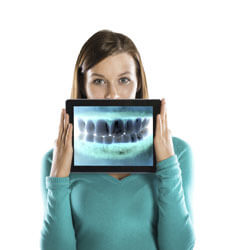What’s the Wisdom on Removing Third Molars?

Wisdom teeth (third molars) typically start developing in the teen years. By the end of that period, the crowns of the wisdom teeth usually begin to erupt through the gums, if there’s sufficient room. By your mid-twenties, wisdom teeth will have entirely erupted through your gums, or become impacted.
While wisdom tooth removal is seen as a rite of passage, not everyone will need to have their wisdom teeth removed. If your wisdom teeth are correctly positioned and completely healthy, they can remain. If wisdom teeth are crowding your other teeth, they will likely require removal.
If wisdom teeth symptoms such as pain, soft tissue infection and extensive tooth decay aren’t addressed, they can eventually lead to various dental problems: damaging adjacent teeth, tooth or gum disease and oral cyst development.
Your dentist can determine the position of your wisdom teeth and recommend the type of extraction.
How to Clean Your Dentures

Keeping your dentures clean and free of bacteria can help you enjoy a healthy, confident smile. Here are some simple tips for cleaning your dentures:
Remove and rinse dentures after eating. To remove food particles and other debris that can get stuck between your dentures, thoroughly rinse them.
Clean your mouth after removing your dentures. Use a soft-bristled toothbrush or gauze to cleanse your tongue, cheeks and roof of your mouth (palate).
Brush your dentures at least once daily. Remove and gently clean your dentures on a daily basis. Brush them lightly with a soft-bristled brush and a nonabrasive denture cleaner.
Soak dentures overnight. Most types of dentures require moisture to retain their shape. Place the dentures in water or a mild denture-soaking solution overnight. It’s essential to follow the manufacturer’s instructions on cleaning and soaking solutions. Store your dentures in a secure place overnight.





